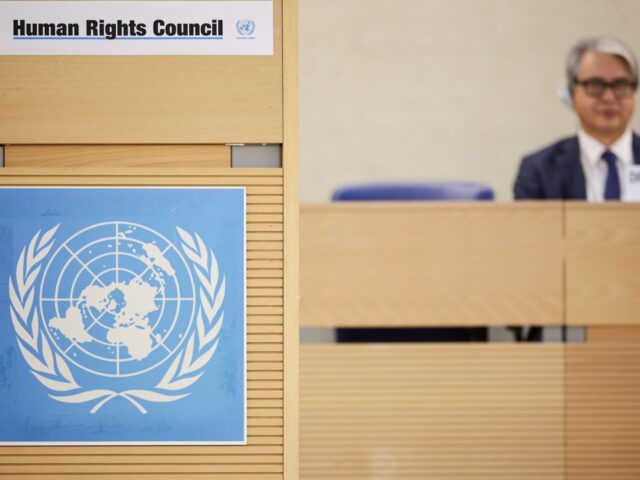The United Nations Human Rights Council held its annual membership elections on Wednesday, resulting in the admission of several human rights violating regimes such as Qatar, Ethiopia, the Democratic Republic of Congo (DRC), and Bolivia.
Notably, the Kingdom of Saudi Arabia made its second failed bid in four years to join the council, losing out to the Marshall Islands.
The Human Rights Council is nominally a body intended to address global human rights abuses and establish coherent global human rights standards. In reality, however, it has for years allowed brutal dictatorships considerable leverage in its activities, neutralizing its potential for positive change. The new membership of the Council, beginning on January 1, will join a reprehensible list of some of the world’s worst abusers including the genocidal communist state of China, its brutal allies in Cuba, and governments with over human rights concerns such as Sudan and Vietnam.
Human Rights Council elections are held by secret ballot, making it possible for state powers to vote for dictatorships without public consequences.
The incoming class of members will replace outgoing states including the UAE, Lithuania, and the United States.
The new class of Human Rights Council members also includes Colombia, currently led by a Marxist former terrorist guerrilla member; Mexico, a nation plagued by mass murders of journalists and corruption; and Thailand, whose government remains dominated by the military after the formal culmination of a junta regime in 2019.
The most alarming new members of the Human Rights Council include Bolivia, DRC, Ethiopia, and Qatar.
Bolivia has been living under the shadow of brutal communist would-be dictator Evo Morales since his attempt to unlawfully remain in power in 2019. After the Organization of American States (OAS) published a report suggesting widespread voter fraud in the 2019 presidential election, Morales, who allegedly won, fled the country along with his top officials, leaving the highest-ranking person in the line of succession to be conservative then-Senator Jeanine Áñez. Áñez organized a special election and chose not to run in it to preserve the democratic character of the race, as she was not elected to the interim position. Morales’s Movement Toward Socialism (MAS) party won the election and promptly arrested her for allegedly staging a “coup.” Áñez remains in prison to this day and has denounced being subject to torture and inhumane treatment.
Qatar is a repressive Islamist regime governed by sharia, or Islamic law, and notorious for using slavery to advance its economy and brutalizing those who allegedly violate the sharia. To host the 2022 FIFA World Cup, Doha was tasked with building brand-new sports facilities near the capital; extensive evidence suggests it heavily relied on slaves to build them. Qatari officials ultimately admitted that as many as 500 slave died building World Cup sites. Qatari officials are also infamous for brutalizing suspected gay people. Shortly before the World Cup began, an unnamed man offered testimony to the British newspaper i that Qatari police allegedly gang-raped and deported him after he made plans to meet another man at a hotel.
UN Watch, an organization that monitors United Nations activity, noted that Qatari Ambassador to the United Nations Hend al-Muftah has a history of making antisemitic remarks – including accusing Jewish people of having “dominated, tyrannized, and ruled the world” – and denigrating LGBT people.
Ethiopia’s government – under Prime Minister Abiy Ahmed, a Nobel Peace Prize winner – faced widespread accusations of genocide throughout the civil war between the government and rebels from the ethnic Tigrayan minority from 2020 to 2022. Addis Ababa blockaded the Tigray region, making it impossible for food or critical medical supplies to enter and endangering civilians.
“We will bury this enemy with our blood and bones and make the glory of Ethiopia high again,” Abiy said of the Tigrayans in 2021.
The Global Centre for the Responsibility to Protect, a human rights NGO, lamented this week that “the election of Ethiopia undermines the credibility of the HRC.”
“The fact that potential mass atrocity crimes are being perpetrated by a number of current HRC member states at home or abroad – including Cameroon, China, Eritrea, United Arab Emirates and Sudan – is also deeply disturbing,” it added.
The DRC has faced years of open warfare among rival gangs for control of its lucrative and morbid mineral mining industry. Mineral mining, which largely benefits Human Rights Council member China, is plagued with abuses, including widespread use of child labor and forced labor in dangerous conditions. As Freedom House detailed in its 2024 profile of the country, the entrenched political regime does not allow for free or fair elections, manipulating the entire process to guarantee the incumbents remain in power.
Most of the new members of the Human Rights Council were elected uncontested. The only competitive elections were in the Asia-Pacific region, where Saudi Arabia lost out to Qatar and the Marshall Islands. Qatar and Saudi Arabia have comparable human rights records, as both are Islamist theocracies. Despite this, Saudi Arabia has failed to be elected to the Council twice, while Qatar will begin its second term on the Council in 2025.
The Human Rights Council has only expelled two states in its history for human rights violations: Libya under dictator Muammar Qaddafi and, more recently, Russia following its full-scale invasion of Ukraine in 2022.

COMMENTS
Please let us know if you're having issues with commenting.